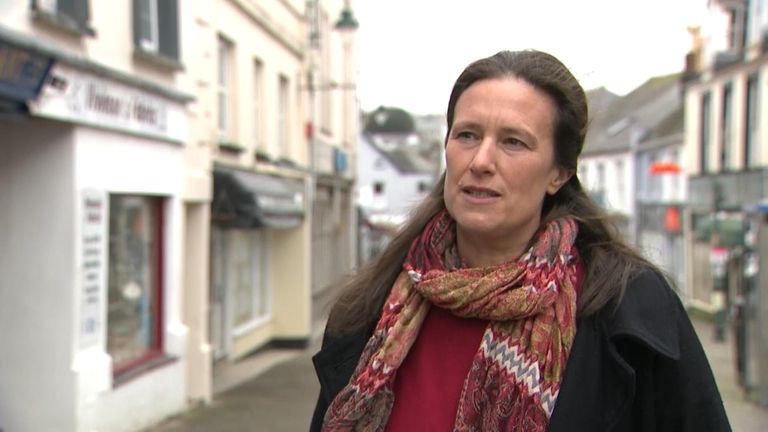COVID-19: Cornwall’s pre-Christmas Tier 1 status ‘directly linked’ to new year surge in cases
Health officials in Cornwall say the “dramatic rise” in COVID-19 cases in recent weeks is “directly linked” to Tier 1 freedoms enjoyed by the county in early December.
The Director of Public Health Cornwall, Rachel Wigglesworth, has told Sky News that two-thirds of all positive cases have been detected in the last two months alone.
In the week to 13 January, there was a total of 8,960 positive COVID-19 cases in Cornwall – an increase of 120% on a month earlier.
“Cornwall weathered the storm quite well during the early stages of the pandemic – but now it’s quite a different story,” said Ms Wigglesworth.
She added: “We think the increase in Cornwall is directly related to the relaxing of the restrictions that we had under Tier 1 in early December and that led to a rapid rise in our cases.
“I think it has been a surprise that we moved so quickly from Tier 1, to Tier 3 and onwards into the national lockdown.
“People have adjusted to that in Cornwall, they understand, but it is a very big contrast to when we were enjoying our freedoms and out in pubs and restaurants just in early December.
“We assume that the new variant has a part to play…but it’s also Christmas mixing on top of that relaxation that compounded to increase the rates in Cornwall.”
The increase has led to hospital admissions for COVID-19 rising significantly – up from just four patients in early December, to 75 on the 14 January.
The Royal Cornwall Hospital – the county’s only major hospital – usually has only 15 intensive care beds – although that number can be increased if needed.
The COVID-19 outbreak is being seen cross the county, but is centred in a number of towns – including Newquay.
The Council says that in recent weeks case rates there have been as high as some parts of London.
“Cases in Newquay have sky-rocketed recently with the virus spreading like wildfire between households in the town,” said Councillor Sally Hawken. “It cannot be understated how serious this situation is and everyone needs to do everything they can to stop more people being infected and our health services becoming overwhelmed.”
Rowena Barrow runs a Facebook support group for those affected by COVID-19 in Newquay. She has spent months isolating due to her husband and daughter being vulnerable.
“In the beginning the group was quite quiet – not many people were getting COVID-19 down here, we were in Tier 1, everybody stuck to the rules so well, cases stayed really low. It was only just before Christmas that numbers started to rise.”
She added: “I asked on the group yesterday ‘How many people have actually had COVID-19?’ People were coming back saying ‘Yes, I did, but I don’t like to say it too much’ – there seems to be a bit of a stigma attached to it that if you admit you’ve had COVID-19 then you must have broken the rules.”
An hour south of Newquay in the hospital town of Truro, we spoke to locals Sally and Pete.
“Well it’s not good, but I’m afraid I do believe people have brought it into the county,” said Sally. “We know for a fact there’s a lot of holiday homes occupied so, that speaks volumes. My daughter is a dentist and she’s seen emergency patients that are from London.”
Pete said he doesn’t think people are taking it seriously enough.
“Even town being as quiet as it is as the moment, social distancing seems to be a no-no.
“You walk around the town and people are just going about their business like there’s no threat whatsoever, no risk, and of course even when it’s reported we are higher in parts of Cornwall than London, it doesn’t seem to have any effect and people seem to be rather blasé about it.”
Rachel Wigglesworth says the hope is the latest national lockdown will help and prevent the county’s only major hospital being overwhelmed.
“We hope we’ll see the impact of the lockdown quite soon but at the moment we’re still seeing our cases continuing to rise so we’re concerned we really want to have the lockdown implemented as effectively as possible to bring those rates down.”
She added: “We are quite fragile, being on the end of the peninsula, distances are greater and this is really going to test the NHS system.”
Source: Read Full Article




